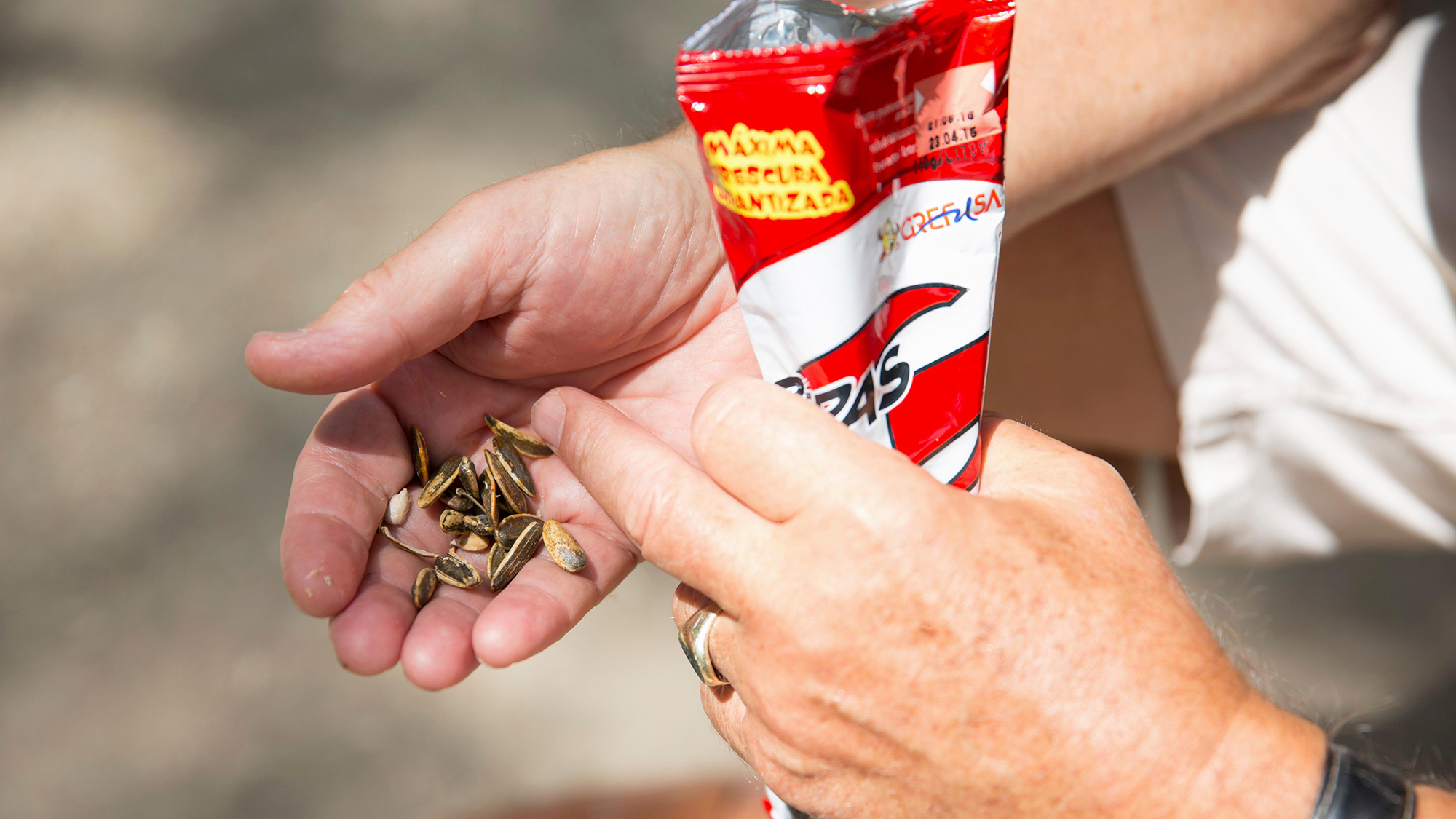Spain's love of sunflower seeds is wrecking its football stadiums
One club controversially bans 'national vice' as discarded 'pipas' shells block drains and erode concrete

A free daily email with the biggest news stories of the day – and the best features from TheWeek.com
You are now subscribed
Your newsletter sign-up was successful
Snacking on sunflower seeds is Spain's "national vice", said The Times. To many, they are "as Spanish as paella".
Eating pipas, which requires snackers to "deftly crack open the shells with their teeth and spit them out", is "associated with conviviality" – as well as occupying the hands of "those of a nervioso, or anxious, disposition".
But among Spanish football fans, the passion is such that one club has been forced to ban the snack from its stadium. The discarded shells "clog drains and pipes", "deteriorate the seats" and contribute to the erosion of the concrete floor, second division side Elche said in a statement. If that wasn't enough, they also "attract infestations of rats and pigeons".
The Week
Escape your echo chamber. Get the facts behind the news, plus analysis from multiple perspectives.

Sign up for The Week's Free Newsletters
From our morning news briefing to a weekly Good News Newsletter, get the best of The Week delivered directly to your inbox.
From our morning news briefing to a weekly Good News Newsletter, get the best of The Week delivered directly to your inbox.
'Horrible habit'
In Spain's football stadiums, pipas are the traditional "snack of choice", said Feast magazine. The "hard-core" snackers seem to "split and eat the seeds in a single swift movement without any trouble".
They're so popular that you might find yourself "wading through" discarded shells from previous games to get to your seat. Sometimes they're left there for weeks, until the floor is "literally covered in a grey carpet of salted shells that crunch under your foot like dead beetles".
"Despite the constant efforts of the club's cleaning teams, it is unfeasible to completely remove the waste after every match," Elche said in the statement. The club says the ban demonstrates "their commitment to sustainability", said The Athletic. Some clubs have also started composting the shells, but others have gone a step further.
In 2023, Valencia stopped selling seeds after its "iconic" Mestalla Stadium became infested with a "swarm of rats", attracted by the "horrible habit of chucking the shells on the floor", said The Sun. "Aggrieved locals" had also complained to the club about the noise of the machines used to sweep shells out of the stands. Fans bringing their pipas from home were urged to also bring a bag for the shells.
A free daily email with the biggest news stories of the day – and the best features from TheWeek.com
Spain's 'football foreplay'
"Pipas are not just snacks, they're Spain's football foreplay," said Athlon Sports. "Fans chomp through nail-biters, launching shells like confetti at a squirrel’s stag party." But Elche's cleaners "faced shell-mageddon weekly, with drains gagging and pressure washers sobbing". The janitors were "one husk away from torching the pitch in protest".
Match-goers, "once free to crack-crack-spit their beloved pipas like caffeinated woodpeckers, now face a nutty nightmare". The ban on these "salty sirens" has left traditionalists "spitting mad", and "cracked the fanbase wide open". "No pipas? Might as well ban joy!" said one, who was "probably carving a seed shrine".
But one fan told The Times that Elche's ban was "the best thing they could have done". They added: "Now they have to enforce the ban on smoking."
Harriet Marsden is a senior staff writer and podcast panellist for The Week, covering world news and writing the weekly Global Digest newsletter. Before joining the site in 2023, she was a freelance journalist for seven years, working for The Guardian, The Times and The Independent among others, and regularly appearing on radio shows. In 2021, she was awarded the “journalist-at-large” fellowship by the Local Trust charity, and spent a year travelling independently to some of England’s most deprived areas to write about community activism. She has a master’s in international journalism from City University, and has also worked in Bolivia, Colombia and Spain.
-
 What is the endgame in the DHS shutdown?
What is the endgame in the DHS shutdown?Today’s Big Question Democrats want to rein in ICE’s immigration crackdown
-
 ‘Poor time management isn’t just an inconvenience’
‘Poor time management isn’t just an inconvenience’Instant Opinion Opinion, comment and editorials of the day
-
 Bad Bunny’s Super Bowl: A win for unity
Bad Bunny’s Super Bowl: A win for unityFeature The global superstar's halftime show was a celebration for everyone to enjoy
-
 The 8 best superhero movies of all time
The 8 best superhero movies of all timethe week recommends A genre that now dominates studio filmmaking once struggled to get anyone to take it seriously
-
 Josh D’Amaro: the theme park guru taking over Disney
Josh D’Amaro: the theme park guru taking over DisneyIn the Spotlight D’Amaro has worked for the Mouse House for 27 years
-
 The best fan fiction that went mainstream
The best fan fiction that went mainstreamThe Week Recommends Fan fiction websites are a treasure trove of future darlings of publishing
-
 Golden Globes affirm ‘One Battle,’ boost ‘Hamnet’
Golden Globes affirm ‘One Battle,’ boost ‘Hamnet’Speed Read Comedian Nikki Glaser hosted the ceremony
-
 ‘One Battle After Another’ wins Critics Choice honors
‘One Battle After Another’ wins Critics Choice honorsSpeed Read Paul Thomas Anderson’s latest film, which stars Leonardo DiCaprio, won best picture at the 31st Critics Choice Awards
-
 The best alcohol-free alternatives for Dry January
The best alcohol-free alternatives for Dry JanuaryThe Week Recommends Whether emerging from a boozy Christmas, or seeking a change in 2026, here are some of the best non-alcoholic beers, wines and spirits to enjoy
-
 13 Gen Z workplace terms and phrases
13 Gen Z workplace terms and phrasesin depth From ‘quiet firing’ to ‘resenteeism,’ there are clues about why employers and employees in America are having such a sad time
-
 Let these comedians help you laugh your way through winter
Let these comedians help you laugh your way through winterThe Week Recommends Get some laughs from Nate Bargatze, Josh Johnson and more